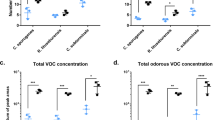Abstract
THE removal of phenolic hydroxyl groups in rats and rabbits was first reported in 1957 by Booth et al.1. More recently, Booth and Williams2 showed that dehydroxylation of caffeic acid to m-hydroxy-phenyl-propionic and m-coumaric acids was also carried out by rat and rabbit caecal contents and sheep rumen liquor. In accord with their results, Booth and Williams suggested that intestinal micro-organisms could be responsible for the dehydroxylation reactions.
This is a preview of subscription content, access via your institution
Access options
Subscribe to this journal
Receive 51 print issues and online access
$199.00 per year
only $3.90 per issue
Buy this article
- Purchase on Springer Link
- Instant access to full article PDF
Prices may be subject to local taxes which are calculated during checkout
Similar content being viewed by others
References
De Eds, F., Booth, A. N., and Jones, F. T., J. Biol. Chem., 225, 615 (1957).
Booth, A. N., and Williams, R. T., Nature, 198, 684 (1963).
Author information
Authors and Affiliations
Rights and permissions
About this article
Cite this article
PEREZ-SILVA, G., RODRIGUEZ, D. & PEREZ-SILVA, J. Dehydroxylation of Caffeic Acid by a Bacterium isolated from Rat Faeces. Nature 212, 303–304 (1966). https://doi.org/10.1038/212303b0
Issue Date:
DOI: https://doi.org/10.1038/212303b0
This article is cited by
Comments
By submitting a comment you agree to abide by our Terms and Community Guidelines. If you find something abusive or that does not comply with our terms or guidelines please flag it as inappropriate.



